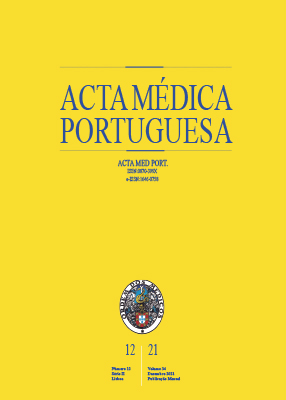Health Problems During and After Travel: A Prospective Observational Study in a Travel Clinic in Portugal
DOI:
https://doi.org/10.20344/amp.14098Keywords:
Antimalarials, Diarrhea, Malaria, Portugal, Travel Medicine, Travel-Related Illness, VaccinationAbstract
Introduction: In order to improve the health of travellers during travel it is important to better understand the health problems faced by travellers in different destinations. The main objective of this study was to characterise the perceived health problems of travellers during and up to six months after travel on a pre-travel clinic in Lisbon, Portugal.
Material and Methods: This is a prospective observational study. Participants were recruited among those travellers attending a pretravel clinic between May 2016 and April 2017, meeting the inclusion criteria (age over 18 years old and predicted time of stay from five to 90 days). Structured questionnaires were applied by telephone interviews, three and six months after arrival. Associations and their magnitude were sought between travel and traveller’s characteristics with total and specific health problems, using multiple logistic regression models.
Results: Out of 364 participants who completed the study, 60% were under 37 years of age, and 87.9% presented a higher educational
degree. Africa and Asia were travel destinations for 89.1% of travellers. Three months after travel, 39.3% confirmed some travel-acquired health problem, namely diarrhoea (26.6%) and unmeasured fever (12.4%). A malaria case was diagnosed, occurring 3.5 months after return. From a total of 189 travellers to countries with high risk of malaria and chemoprophylaxis recommendation, 65.6% adhered completely and 6.9% of those presenting fever during travel sought healthcare.
Discussion: The proportion of travellers that became ill was lower compared to other published studies. Failure to follow a random
sampling method and the characteristics of the travel consultation with a particular profile of travellers in terms of level of education and ability to pay, challenges the external validity of the study.
Conclusion: Health problems during or after travel occurred in 39.3% of travellers with diarrhoeal disease being the most common (26.6%). From our findings, the need for taking chemoprophylaxis for malaria or seeking health care in the presence of fever is not translated into appropriate action. The reasons are unclear and should be the subject of further research. Furthermore, research is needed with inclusion of other centres practicing travel medicine in Portugal, both in the pre-travel setting and others, in order to better understand the health risks associated with Portuguese traveller’s characteristics and destinations.
Downloads
Downloads
Published
How to Cite
Issue
Section
License
Copyright (c) 2021 Acta Médica Portuguesa

This work is licensed under a Creative Commons Attribution-NonCommercial 4.0 International License.
All the articles published in the AMP are open access and comply with the requirements of funding agencies or academic institutions. The AMP is governed by the terms of the Creative Commons ‘Attribution – Non-Commercial Use - (CC-BY-NC)’ license, regarding the use by third parties.
It is the author’s responsibility to obtain approval for the reproduction of figures, tables, etc. from other publications.
Upon acceptance of an article for publication, the authors will be asked to complete the ICMJE “Copyright Liability and Copyright Sharing Statement “(http://www.actamedicaportuguesa.com/info/AMP-NormasPublicacao.pdf) and the “Declaration of Potential Conflicts of Interest” (http:// www.icmje.org/conflicts-of-interest). An e-mail will be sent to the corresponding author to acknowledge receipt of the manuscript.
After publication, the authors are authorised to make their articles available in repositories of their institutions of origin, as long as they always mention where they were published and according to the Creative Commons license.









